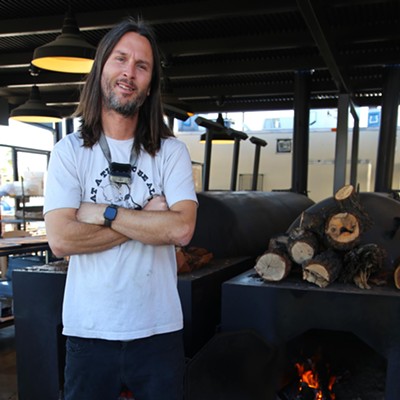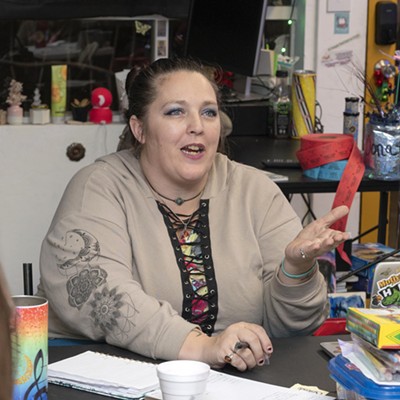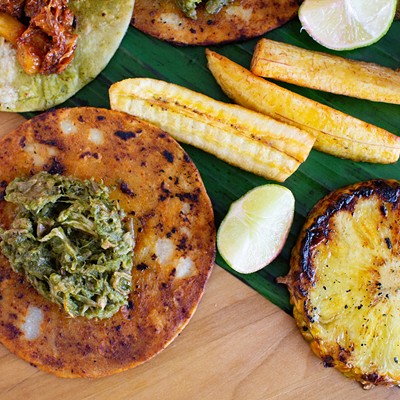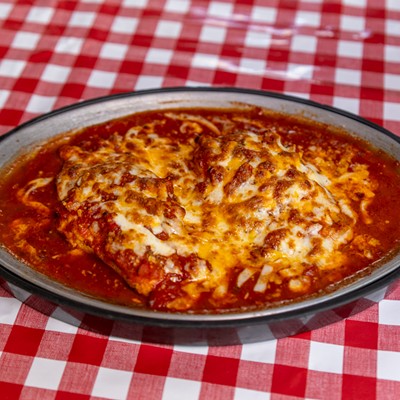I just hope Tucson is ready for it.
I visited Seven Cups on a recent Saturday evening with friends Hugh and Rachid. The place was fairly empty--after walking through the front of the store, where bulk teas are for sale, and into the dining room, we noticed that there was only one man, sitting at one table. The co-owner, Austin Hodge--his wife, certified tea master Zhu Ping, had already left for the day--noticed our presence and invited us to sit at any of the other tables.
And what tables they are. Polished and carved with Asian designs, they are one piece of the puzzle that makes Seven Cups one of the most calm and welcoming areas I've run across in Tucson: a place where you can just chill for a while. Oriental music plays in the background, mixing with the hum from the aquarium in a back corner. Tables line one side of the room, while cabinets featuring all sorts of teacups, sets and pots--all for sale--line the other. (Small shelves with available tea-related wares also sit on each table.) Ceiling fans twirl overhead, and pink lamps over the tables add a splash of color to the room. It's a lovely little spot.
It was a welcome respite for Hugh, Rachid and me. Without going into details, I'll say that we were all pretty stressed for various reasons when we entered Seven Cups. But the atmosphere--combined with a healthy dose of delicious, high-quality tea--calmed us into delightful mellowness by the time we left about an hour later.
But I am getting ahead of myself. After sitting down, we scanned the menus, trying to decide between all the teas; there were 35 or so available--green, oolong, white, black (red), puer and scented teas, along with some iced teas. (If you want to get clarification on what each of these types of tea are--and maybe even buy some--check out sevencups.com.) They can be ordered in gai wan, aka traditional cups; in a small pot, meant for one; or in a large pot, meant for two. The teas, while not prohibitively expensive, are not cheap; most small pots run from $3 to $4.80, with large pots ranging from $5.10 to $8.15 and a handful ranging as high as $12.75. Since Zhu Ping had already left for the day, we could not participate in a tea ceremony ($7.50 plus the cost of the tea), but you can bet we'll return to see what that entails.
Also on the menu: Japanese pastries ($2.25-$2.50) from the Mikawaya Bakery, which has been around for 90 years in Los Angeles--and 300 years in Japan. Seven Cups also offers four types of ice cream. It's a lot to choose from, and after a bit of discussion and thought, we each made our decisions.
Hugh and Rachid each chose green teas. Hugh ordered the Buddha's Eyebrow ($3.25 small pot, described on the Seven Cups Web site as: "The aroma is wonderful, and it has a more robust, full flavor than some of our other green teas. This is an incredibly popular tea--in fact, it's the tea most commonly consumed in China ..."). Rachid chose the LongJing "Dragon Well" ($4.50: "The best-known of all China's teas. Hand refined by more than 10 traditional techniques, it is said to have the four uniques: a jade color; a distinctive aroma; a chestnut-like flavor, and leaves 'shaped like a sparrow's tongue.' This is the tea favored by emperors and the tea that was served to Mao Tse-tung and Richard Nixon during their famous meeting"). I chose the Snow Orchid oolong ($4.60; I couldn't find it on the Web site, but it was a strong and delicious tea).
For pastries, Hugh chose the yomogi-mochi ($2.50), a mugwort herb pastry filled with red bean paste. Rachid ordered the orange gyuhu ($2.50), tender mochi (pounded rice paste) with a hint of orange. I got the azuma ($2.50), a walnut-topped pastry filled with dark bean paste and black sugar. (My first choice, hiyoko, a chick-shaped pastry, was out of stock.)
The teas and pastries were all delivered swiftly, and then we were left to chat, sip, stir and enjoy. Every so often, Mr. Hodge would come by and fill our pots with hot water, but otherwise, we were left alone to just calm down, drink delicious tea and forget about the world that zoomed by outside. It was a nice moment.
Seven Cups is not perfect--it would have been nice to be able to have a tea ceremony, and the price tags on everything, including the pots and cups for sale on the tableside shelves, allowed a bit too much commercialism to seep into the sanctuary--but it's pretty darned close. Austin Hodge and Zhu Ping should be applauded for this venture.
And this returns me to my previously stated worry: Is Tucson is ready for a place like this? Our fair city is like many others in that chains and sameness seem to often win out over originality and uniqueness. Will Tucsonans go to Seven Cups and pay $4.60 to sit for an hour and sip tea, when Starbucks is just down the street?
I hope to God that enough of them will. Because of Seven Cups, Tucson is a better--and slightly calmer--place.










